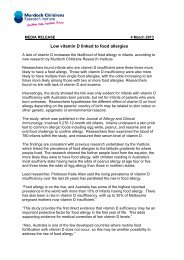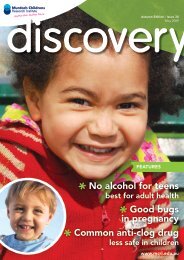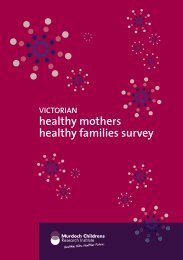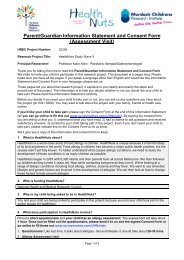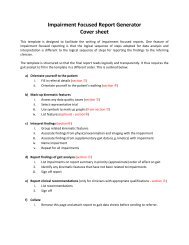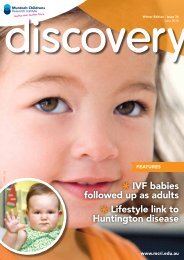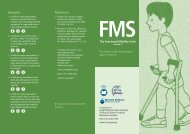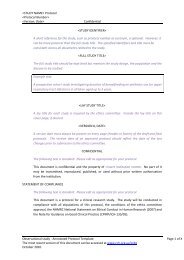Case Studies - Murdoch Childrens Research Institute
Case Studies - Murdoch Childrens Research Institute
Case Studies - Murdoch Childrens Research Institute
Create successful ePaper yourself
Turn your PDF publications into a flip-book with our unique Google optimized e-Paper software.
CASE 3<br />
[Based on real life case]<br />
Unobtrusive observation: <strong>Research</strong> involving an online<br />
support group<br />
A psychologist researching young people who engage in self-harming behaviours<br />
has chosen an online support group to obtain data. He has chosen a ‘pro-anorexia’<br />
online support group. Members of the group advise on how to become and remain<br />
anorexic. An important feature of the group is that it allows unguarded self-disclosure<br />
while offering anonymous support and acceptance amongst its members. The<br />
proposed study will provide health professionals with an ‘insight that may otherwise<br />
be unattainable’ and this insight ‘can contribute to the development of effective<br />
therapies and treatments’ for anorexia. 2 Unobtrusive, passive observation is the<br />
method chosen by the researcher in order to protect the group from disruption and to<br />
avoid interviewer bias. This method can be likened to eavesdropping on the on-line<br />
exchanges and the members of the group do not know that they are being observed<br />
and researched.<br />
Questions:<br />
1. When is unobtrusive observation on the internet without consent acceptable<br />
2. Does it depend on what sort of group it is<br />
3. If the researcher changes pseudonyms and paraphrases quotes, is this sufficient<br />
to avoid identification of individuals<br />
Further questions:<br />
4. If a researcher felt that the identity of individuals in a ‘pro-anorexia’ website<br />
support group need not be protected given that they promote harm to self and<br />
others, would this be relevant<br />
5. If the researcher felt that the members would be better served if the group was<br />
disrupted, is this relevant to the ethics of the research<br />
2<br />
Gavin, Rodham and Poyer, “The presentation of ‘Pro-Anorexia’ in online group interactions” 326. This case is<br />
based on a study about issues of identity in ‘pro-anorexia’ online group interactions.<br />
<strong>Case</strong> <strong>Studies</strong> - 6 -



